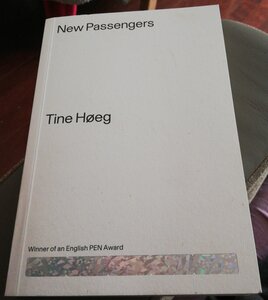
One of my favourite literary awards, the Republic of Consciousness Prize for Small Presses, offers its own Book of the Month subscription. I signed up for it this month, and recently finished my first title, Tine Høeg’s New Passengers (translated from the Danish by Misha Hoekstra). It’s from a publisher that was new to me – the European-focused Lolli Editions – and has a strikingly stark cover design. I was intrigued even before I knew much about the book.
The first thing you notice about the text of New Passengers is that it’s laid out like a poem:
it’s by chance
we fall to talking on the train
my first day of teaching
I’m nervous and our legs
graze each other
when we sit down
you’re a graphic designer at a travel agency
you’re a commuter too
you’re ten years older than me
you’re married and father to a girl
These two characters embark on an affair, and there you have the basic premise of Høeg’s novel. But it’s not the premise that matters so much as the telling.
What does this fragmentary verse-style prose do? For me, it does two key things: it breaks the novel into small pieces, and allows them to merge together.
Høeg’s narrator is having to compartmentalise her life: over here is teaching, over there is her older lover, and so on. The thing is, the different parts of her life won’t necessarily stay separate, especially after she meets her lover’s wife and daughter. Nor is this the only example: the woman is well aware that she’s not much older than her pupils, and the past keeps threatening to intrude on her – supposedly more responsible – present.
This then plays out in the novel as the sense that snatches of prose from different areas of the narrator’s life are encroaching on each other (Hoekstra’s translation is great at conveying this). It takes you right inside the narrator’s situation, which in turn makes for some powerful reading.
Recent Comments